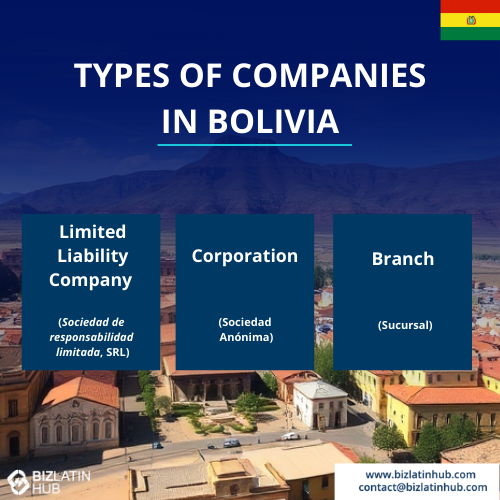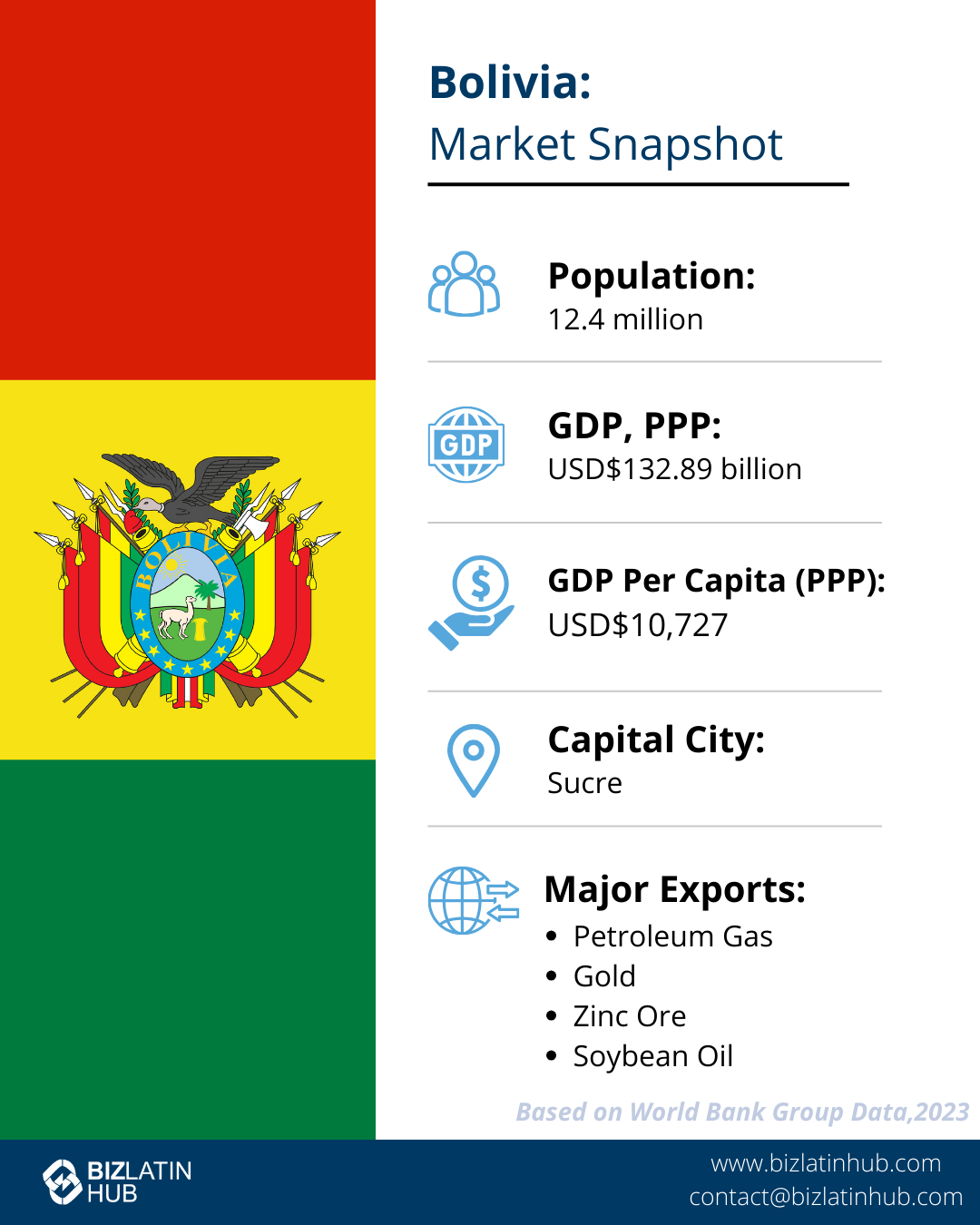Company formation in Bolivia offers investors access to a growing market, abundant natural resources, and a favorable business environment. Bolivia company formation provides opportunities to benefit from the country’s strategic location, low operating costs, and investor-friendly policies. Doing business in Bolivia unlocks significant financial and competitive advantages in a thriving economy. At Biz Latin Hub, we specialize in Latin America, offering expert guidance to ensure a seamless setup process. This guide breaks down the complete incorporation process, from initial legal preparations to final capital deposit, to ensure you can navigate the Bolivian business landscape with confidence.
Key Steps To Company Formation in Bolivia
| Is Foreign Ownership Permitted? | Yes, a business in Bolivia can be 100% foreign-owned by either legal or natural persons. |
| Steps for Company Formation in Bolivia: | Step 1: Draft and Sign a Power of Attorney (POA) Step 2: Formalize the Deed of Incorporation Step 3: Register Your Company with the Public Registry Step 4: Obtain Your Tax ID Number (NIT) Step 5: Register with the National Health Insurance Entity Step 6: Register with a Pension Fund Administrator (AFP) Step 7: Obtain the Obligatory Business License Step 8: Open a Corporate Bank Account Step 9: Deposit Your Initial Investment Capital |
| What Are The Common Entity Types in Bolivia? | Limited Liability Company (Sociedad de responsabilidad limitada) Corporation (Sociedad Anónima) Branch (Sucursal) |
| Why Choose to Incorporate a Company in Boliva? | It is not required to be physically present meaning you can go through the process of company formation in Boliva 100% remotely. |
Key Considerations Before Starting
- Legal Representation: Securing a local legal representative is essential. This individual will be responsible for navigating the various government agencies and signing documents on your behalf.
- Entity Selection: The choice between an SRL and an SA depends on your business scale and shareholder structure. An SRL is simpler and suited for most new ventures, while an SA is designed for larger operations that may seek public investment.
- Bureaucratic Timeline: The company formation process in Bolivia involves multiple government bodies. Be prepared for a process that can take several weeks to complete.
9 Steps to Form a Company in Bolivia
- Step 1: Draft and Sign a Power of Attorney (POA)
- Step 2: Formalize the Deed of Incorporation
- Step 3: Register Your Company with the Public Registry
- Step 4: Obtain Your Tax ID Number (NIT)
- Step 5: Register with the National Health Insurance Entity
- Step 6: Register with a Pension Fund Administrator (AFP)
- Step 7: Obtain the Obligatory Business License
- Step 8: Open a Corporate Bank Account
- Step 9: Deposit Your Initial Investment Capital
You will need to collect all necessary documents including identification, proof of residence, and any additional documents required for specific business structures. If any shareholder is a foreign national, their documents must be apostilled (if applicable), then translated into Spanish if they are not already. Have all documents notarized by a public notary in Bolivia or a Bolivian consulate/embassy if the documents are notarized abroad.
Expert Tip: Navigating the Power of Attorney (POA) Process
Based on our experience, the Power of Attorney (POA) is the most critical and often time-consuming step for foreign investors. A common mistake is underestimating the legalization and translation requirements. To avoid significant delays, ensure your POA is apostilled in your home country and then officially translated into Spanish by a court-certified translator in Bolivia before you begin the incorporation process. We advise clients to work with their legal counsel to draft a comprehensive POA that covers all necessary actions, including company registration, tax registration, and bank account opening, to prevent the need for additional POAs later.
Step 1: Draft and Sign a Power of Attorney (POA)
Draft and finalize the powers of attorney for each shareholder, ensuring they are legally compliant and notarized.
Step 2: Formalize the Deed of Incorporation
All shareholders at the point of incorporation must sign the Deed of Incorporation and have it officially recognized by a notary public.
Step 3: Register Your Company with the Public Registry
Submit all notarized and apostilled documents to the Public Registry of Commerce in the appropriate city and pay the registration fees. This step will officially establish the company. This step is critical as it formally establishes your business as a legal entity within Bolivia. Ensure all submitted documents are properly notarized.
Step 4: Obtain Your Tax ID Number (NIT)
Apply for the NIT from the Tax ID Authority and register the company’s fiscal address. This step is crucial for tax compliance.
Step 5: Register with the National Health Insurance Entity
Once you have your NIT and company registration you will be a legal employer, which means registering with the National Health Entity in order to stay compliant with your obligatory contributions.
Step 6: Register with a Pension Fund Administrator (AFP)
Just as you have to be compliant with your responsibilities towards employees for healthcare, so too with pensions. As above, this is critical for staying legal and will require the NIT and company registration.
Step 7: Obtain the Obligatory Business License
All legally operating businesses in Bolivia must have a business license (licencia de funcionamiento) to make sure they are able to trade. However, the exact requirements depend on a variety of factors such as size of business, sector and physical location, so confirm your specific needs with an incorporation agent.
Step 8: Open a Corporate Bank Account
Once the company is registered and has its NIT, open a bank account in the name of the company. This account will be used for financial transactions and to comply with banking regulations. Be prepared for banks to request detailed information about the company’s shareholders and legal representative as part of their due diligence process.
Step 9: Deposit Your Initial Investment Capital
Now that you have a local bank account, you will need to float it with your initial startup capital. We recommend at least USD$1000, although this may depend on the size of your business and sector you operate in.
3 Types of Business Formation in Bolivia
After deciding to start the company formation in Bolivia process, you will need to select the best type of legal entity in Bolivia to suit your business needs and goals. The most common types of legal entities are outlined below:

- Limited Liability Company (Sociedad de responsabilidad limitada, SRL): This is the most simplified legal structure and the most common for most business activities. It requires a legal representative to be appointed within the company bylaws, a fiscal address, a minimum of two shareholders, and USD$500 of minimum capital. In our experience, this is one of the best entities to form in Bolivia.
Best For: Small to medium-sized enterprises (SMEs), startups, and foreign companies seeking a straightforward structure with protected liability. - Corporation (Sociedad Anónima): Suitable for medium and large-sized companies. Corporations require three directors (one must be a resident of Bolivia) and three shareholders, who can be foreign or local. Incorporating a Corporation also requires a Síndico (controller), an auditor, and a fiscal address. Companies that generate over USD$160,000 must submit annual financial statements to the Tax Authority and SEPREC.
Best For: Large businesses, companies that intend to have many shareholders, or those planning to raise capital through public stock offerings. - Branch (Sucursal): Setting up a branch office in Bolivia grants your foreign parent company the opportunity for full ownership, with 100% participation. To initiate this process, you need to officially register the branch office in Bolivia and designate a legal representative who must be a resident of Bolivia and have a local fiscal address.
Best For: Established multinational corporations looking to expand their operations directly into Bolivia while being legally dependent on the foreign parent company.
What are the Minimum Requirements to Incorporate an SRL in Bolivia?
The 4 minimum requirements to incorporate an SRL in Bolivia are:
- Minimum of 2 shareholders, which can be either natural persons (i.e. individuals) or legal persons (i.e. entities.).
- Contribute a minimum initial capital of USD$500. – Important Note: Based on our experience, we would always recommend a minimum initial capital of USD$1500 to ensure an efficient bank opening process.
- Appoint a Legal Representative within the company bylaws, who must be a local national or a foreigner with the right to live and work in the country; normally this is a lawyer, the founder, or a senior executive within the company.
- Register a Fiscal Address which must be within the country and used for official correspondence.
Important Tip: The founding shareholders do not need to physically travel to the country as the establishment can be completed via a power of attorney
What Documents Do You Need to Start Your Company Formation in Bolivia?
To begin incorporating your new subsidiary company in Bolivia, you will need to provide the following:
- A name for your legal entity.
- Shareholders’ identification documents.
- Confirm the business activities, corporate purpose, and primary operations.
- Minimum initial capital contribution.
- Company duration can vary from 1 to 99 years, with the possibility of renewal.
Important Tip: We always recommend having a preferred legal name and two alternatives in case the primary legal name is unavailable.

Get a Bolivian Visa With Your Legal Entity
Foreign executives planning to register a company in Bolivia can apply for a business visa. The country offers investors permanent residence after two years of living in the country. After residing continuously in the country for three years, citizenship becomes accessible. It is essential to consult with the Bolivian consulate or embassy in your home country to understand the specific requirements for this visa category.
For those who wish to invest in Bolivia and remain in the country for more extended periods, there are other residency and citizenship options available. The Investor Visa (Visa de Inversionista) is for those planning to invest more than USD$50,000 in a Bolivian business or real estate. This visa allows investors to live in Bolivia for up to five years with the possibility of extending it further.
FAQs when Forming a Company in Bolivia
Answers to some of the most common questions we get asked by our clients.
1. Can a foreigner own 100% of a company in Bolivia?
Yes, Bolivia allows for 100% foreign ownership of a company. There are no restrictions that require local partners or shareholders, providing full control to foreign investors.
2. What is the Bolivia Company Tax ID?
The Bolivia Company Tax ID is known as the NIT (Número de Identificación Tributaria) it is also known as a Tax Identification Number, a unique identification number for tax purposes in Bolivia.
3. How long does it take to register a company in Bolivia?
Company formation in Bolivia can take 5 to 6 weeks after the required documentation has been provided by the client.
4. What does an S.A. company name mean in Bolivia?
The S.A. in a company name in Bolivia refers to a “Sociedad Anónima,” which is similar to a joint stock company. This legal framework sets up the company as an entity distinct from its shareholders. Each holds shares that symbolize ownership. Shareholders’ liability is limited to the value of their shares, creating a layer of protection.
5. What does an SRL company name mean in Bolivia?
An SRL company name in Bolivia stands for Sociedad de Responsabilidad Limitada, which is similar to Limited Liability Company in English. This legal entity operates independently from its shareholders, offering them limited liability. The SRL structure is widely used for company formation in Bolivia and the preferred choice for various types of business endeavors.
6. What entity types offer Limited Liability in Bolivia?
The Sociedad de Responsabilidad Limitada (S.R.L.) is the limited liability entity type.
7. What are the main differences between SA and S.R.L. in Bolivia?
These are the main differences between an SA and an SRL in Bolivia:
| S.R.L. (Sociedad de Responsabilidad Limitada) | S.A. (Sociedad Anónima) | |
|---|---|---|
| Shareholders | Minimum: 2 Maximum: 25 | Minimum: 3 Maximum: Unlimited |
| Shareholders Meeting | Called Asamblea de Socios | Called Junta de Accionistas |
| Duration | Up to 99 years (renewable) | Up to 99 years (renewable) |
| Capital | Subscribed | Subscribed, Paid, Authorized |
| Legal Representation | 1 legal representative required (optional to add more) | Board of Directors (Minimum: 3, Maximum: 12) |
| Transfer of Shares | Shareholders meeting required | Free transfer of shares |
8. Do I need to be in Bolivia to register my company?
No, you do not need to be physically present in Bolivia. The entire company formation process can be managed remotely through a duly granted Power of Attorney (POA), which authorizes a legal representative to act on your behalf.
9. What is the minimum number of shareholders required for an SRL?
A Limited Liability Company (SRL) in Bolivia requires a minimum of two shareholders and can have a maximum of 25. The shareholders can be of any nationality.
10. What are the main ongoing compliance duties for a company in Bolivia?
Companies in Bolivia must fulfill monthly tax filings with the National Tax Service (SIN). They are also required to make monthly contributions to the national health insurance system and a pension fund administrator (AFP) for all employees. Annually, companies must renew their business license.
Why Choose to Incorporate a Company in Bolivia?
The country is a member of the World Trade Organization and the Andean Community and an associate member of MERCOSUR, making company formation in Bolivia attractive. According to data from the Bolivian Institute of Foreign Trade (IBCE), in 2023, Bolivia’s total trade volume reached $US 10.5 billion. The country’s main trading partners in 2023 were Brazil, Argentina and China.
Bolivia does not require you to travel to the country to complete the incorporation process. This means you can set up from anywhere and begin to recruit staff, saving you time and money. CEOs and investors who want to expand into multiple markets quickly will find this particularly attractive.
Since Bolivia is near other Latin American markets like Peru, Chile, Paraguay, and Brazil, company formation in Bolivia allows you to reach various nearby markets for trade. Once you have incorporated your company, you can apply for a corporate business account and begin trading freely in the market.
Biz Latin Hub can help with Company Formation in Bolivia
At Biz Latin Hub, our team of legal and accounting multilingual specialists is equipped to deliver excellence and provide services designed for international executives looking to expand into Latin America. We offer complete bilingual support for entering the market and handling administrative tasks.
Choose us as your leading contact for company formation in Bolivia and guarantee the success of your business activities. Contact us now, and we’ll get back to you with a personalized strategy to unlock new commercial opportunities for your company in Bolivia. Learn more about our team and expert authors.






